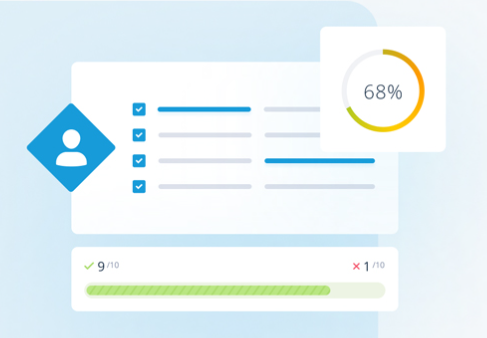“If I could just get to the interview, I’ll be able to land the job.”
Many job seekers have this thought as they send out resumes. They hope to break the barrier and get their resume in front of a hiring manager. But how can you position your application to show you’re the best candidate for the job?
By analyzing our data of almost a million job searches, we have a roadmap that shows you exactly what steps to take to boost your chances of getting an interview.
We looked at data points like:
- Did the applicant include a job title that matches the job description?
- Did the applicant include a cover letter?
- Did the applicant use LinkedIn optimization?
- Did the applicant list higher degrees?
- Did the applicant list relevant certifications?
Our review of the data found that seemingly small details matter on your resume when you’re trying to get an interview.
Read our report to uncover the data-backed variables that will help you land a job.
Boost your interview chances by 3.5 times by using the job listing title on your resume
Job titles quickly describe your role and how you differ from other candidates. The hiring manager can determine your position, work responsibilities, and seniority level at a glance.
Aligning your job title with the job description can improve your chances of getting an interview by attracting the attention of the hiring manager and recruiter.
A job title match is critical for the ATS, the applicant tracking system. When you apply for a job, the ATS stores it in a digital database. Hiring managers then input keywords to find the strongest candidates.
Job titles are essentially keywords, so when the hiring team inputs the job title into the digital search engine, your resume will float to the top of the results.
Our analysis shows that matching the exact job title on your resume makes it 3.5 times more likely you’ll land an interview.

You can add your job title match in two places:
“If you are unsure about using a title different from your current job,” Suzanne Berger, an Innovative Career Consultant, says you should “Consider that titles are specific to a company, and your skills are transferrable to many roles. Matching your headline to the posted role with a summary of your relevant skills highlights that you have the skills needed for the posted role, no matter what your job title is at your current company.”
Your resume headline job title is the place to narrow your work history down to a theme that aligns with the hiring manager’s goal. This title isn’t static and should change to match the job description. Write a unique resume headline with the job title match for each application.
“The resume headline is your first impression to the reader,” shares Kelli Hrivnak, Founder of Knak Digital, a boutique recruitment firm that specializes in identifying and matching technology, digital marketing, and creative talent with hyper-growth businesses.
“Come in strong with a hook that grabs their attention and keeps them reading. What could this entail? The target job title or a brief unique value proposition, like Data-Driven Finance Strategist: Optimizing Financial Operations.”
Tips for writing your resume headline with a job title match
Write a winning resume headline that will land you an interview with a few quick tips:
- Include relevant keywords.
- Keep it short.
- Use title case.
- Write multiple versions.
- Reference certifications, licenses, or achievements.
Extra advice from Kelli Hrivnak, Founder of Knak Digital: “Focus on your results, not years of experience.”
Don’t let a lack of practical experience keep you from showing off in your resume headline. Add awards, scholarships, study abroad opportunities, or fellowships to differentiate yourself from other candidates.
Increase your interview chances by 1.9 times by including a cover letter
Cover letters still boost your interview chances in today’s job search. Hiring managers still read cover letters and they can be a differentiating factor—if another applicant has similar qualifications, but you wrote a standout cover letter, it can give you a competitive edge.
We studied the data and it shows that including a cover letter with your resume makes you 1.9 times more likely to be invited for an interview compared to those who left out a cover letter.

Write a cover letter fast
Writing a standout cover letter is easier said than done. But Jobscan’s cover letter generator makes it painless. The AI tool pulls information from your resume and the job description to write a personalized and impactful cover letter.
This cover letter example below shows the key components of a standout cover letter. Well-written cover letters can boost the strength of your candidacy and expand on key experiences that support your resume.

Change the recipient information from generic “To whom it may concern” or “Dear Hiring Manager.” Browse LinkedIn and find the person most likely to read your resume, whether that’s a recruiter, hiring manager, or a department manager in smaller companies.
Enhance your chances of getting an interview by 1.5 times by using LinkedIn optimization
Recruiters and hiring managers can’t find out more about you without an optimized LinkedIn profile. 94% of recruiters use LinkedIn to vet potential candidates and 87% use LinkedIn specifically to find candidates for jobs.
According to Clair Levy of Precision Resume Solutions, “Recruiters and hiring managers love to do a little LinkedIn snooping (in a good way!) before deciding who gets that golden ticket to an interview.”
Our data analysis shows that job seekers who used Jobscan’s LinkedIn optimization tool were 1.5 times more likely to land an interview than those without an optimized profile.

In today’s digital world, Clair shares that “a candidate’s LinkedIn presence can make a huge difference in getting an interview.”
How to optimize your LinkedIn profile
LinkedIn optimization can boost your search impressions by 6 times. Jobscan’s premium LinkedIn Optimization tool is an effortless way to create a big impact in minutes. It performs over 40 checks on your profile, including:
- Hard skills
- Measurable results
- Negative tone
- Buzzwords
- Vanity URLs
By offering sample phrases and word suggestions, you can write a professional LinkedIn profile that encourages recruiters to chase you instead of the other way around.
Raise your chances of landing an interview by 2.5 times by listing a higher degree
Your college degree, whether a bachelor’s, master’s, or PhD, can boost your chances of getting an interview for your dream job. The Bureau of Labor Statistics data shows that those with degrees face lower rates of unemployment.
Those without a degree faced the highest rate of unemployment at 5.5 percent in 2022, while those with advanced degrees had an unemployment rate of 4 percent or less.
Our analysis of a million resumes shows that job seekers with a higher degree, including bachelor’s, master’s, or PhD are 2.5 times more likely to get an interview than those without a degree.

Keep reading: How to List Degrees on Your Resume
Multiply your chances of getting an interview by 2.9 times by including professional certifications
Earning certifications to include on your resume can provide a range of benefits for your career by helping you advance in your role and make a higher salary. But it also enables you to stand out in your job search.
According to Jobscan’s data, you’re 2.9 times more likely to get an interview if you have a professional certification relevant to your industry and role.

Certifications can help elevate your resume by:
- Showing your commitment to continued learning.
- Highlighting your specialized skills and knowledge.
- Providing a competitive advantage.
Free certifications to add to your resume
You don’t have to spend hundreds or thousands of dollars for professional certifications in your resume. You can access free or low-cost certification courses from reputable organizations online, including:
Find more free courses: 27+ Free Certifications to Add to Your Resume in 2024
How to list certifications on your resume
You can create a dedicated resume section to emphasize your certifications. To list certifications on your resume, include:
- The full name of the certification
- The issuing organization
- The date of completion and expiration, if applicable
- Location, if completed in person
“One benefit of earning free certifications is acquiring industry knowledge that you can add to your resume and LinkedIn profile as keywords. You may not be able to demonstrate these areas as skills or expertise, but adding them as additional training or courses completed gets these keywords in front of recruiters.”
— Steph Cartwright, Job Search Strategist, Certified Resume Writer, and the solopreneur behind Off The Clock Resumes.
Key takeaways

Ultimately the key components you need to secure an interview are:
- A job title match
- A cover letter
- An optimized LinkedIn profile
- A properly listed degree
- Relevant certifications
With an optimized resume filled with highly relevant details of your experience and credentials, you’ll position yourself as a candidate no recruiter can ignore.
FAQs
Tailor your resume for each job application. Highlight your relevant skills and experiences, use strong action verbs, and ensure it’s formatted cleanly. Use keywords from the job description and quantify your achievements with numbers when possible.
Personalize your cover letter for each application. Address it to a specific person if possible, and clearly state why you are interested in the position and how your skills and experiences make you a great fit. Share a brief story or example that demonstrates your qualifications and enthusiasm.
Optimize your LinkedIn profile with a professional photo, a compelling headline, and a detailed summary that highlights your skills and achievements. Engage with content related to your industry, join relevant groups, and connect with recruiters and industry professionals. Regularly update your profile and share your accomplishments.
Use a multi-faceted approach: apply through job boards, company websites, and recruitment agencies. Set up job alerts to stay updated on new openings. Research companies you’re interested in and apply directly on their career pages. Customize your application materials for each job to increase your chances of standing out.
Research the company and the role thoroughly before your interview. Practice common interview questions and prepare your answers using the STAR (Situation, Task, Action, Result) method. Prepare questions to ask the interviewer, and dress appropriately. Arrive on time, be polite, and follow up with a thank-you email after the interview.
Review your resume and cover letter to ensure they are tailored and error-free. Consider reaching out to employers for feedback. Expand your job search criteria and try new job search strategies. Networking can also uncover opportunities that aren’t advertised.
Yes, a polite follow-up can show your enthusiasm and keep your application top of mind. Wait about a week after submitting your application, and send a brief email expressing your continued interest and asking about the status of your application.


















